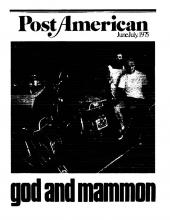The right to amass capital and its concomitant power has been maintained and practiced by many Christians. It is not without cause that Marx connects Christianity with capitalism. But is this a world-picture that radical Christians must accept? Must we merely attempt to reform capitalism or does the Bible present a radical alternative against which our present circumstances must be judged and towards which we must strive? The answers to these questions, which are basic to any radical Christian critique of society, lies in a scriptural analysis of what it means to be the people of God and the implications of this social concept for our own lives.
Christians are often referred to as God's people. 1 Peter 2:9, for instance, applies this title along with several others. The roots of that title, however, lie in the Old Testament. That is, "kingdom of God" and "people of God" were applied to Israel before they were used by Christians. To obtain a biblical perspective for the meaning of this term and its relationship to the use of wealth, we must first look at the Old Testament.
Old Testament Economies
The Old Testament meaning of being the people of God can be summarized in two propositions. First, the basic Old Testament picture of the people of Israel is not that of a monarchy (in the sense that we think of Saul's, David's, or Solomon's reign) but that of a theocracy. We must remember this fact, for the prophets constantly judge the social conditions of the current monarchy against this theocratic ideal.
Read the Full Article

